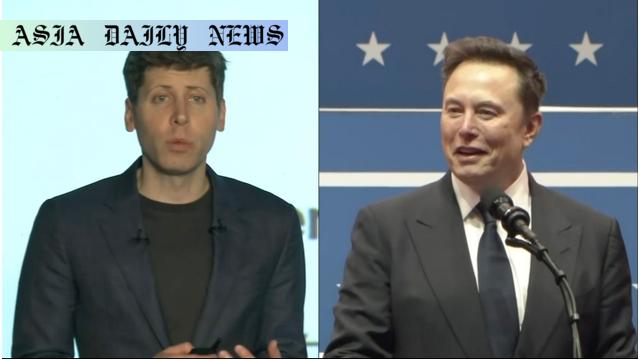OpenAI: A group led by billionaire Elon Musk has made a $97.4 billion bid to acquire OpenAI amidst concerns about its transition.

Overview of Elon Musk’s High-Stakes Bid
In a bold endeavor, Elon Musk, together with a team of investors, has made a $97.4 billion offer to purchase OpenAI, the company behind the renowned AI model ChatGPT. Widely recognized for pushing boundaries in the tech world, Musk aims to steer OpenAI back towards its original mission of fostering open-source systems and prioritizing safety. This proposal comes during a pivotal time for OpenAI’s strategic direction, with the organization transitioning from a nonprofit to a for-profit model in recent months.
The Ambitious Offer and Its Implications
According to reports from The Wall Street Journal, Musk’s legal representatives presented the proposal on Monday to the nonprofit entity overseeing OpenAI. Musk has publicly stated his desire to see OpenAI realigned with its roots as “an open-source, safety-focused force for good.” Such a transition directly opposes the trajectory OpenAI currently pursues, as evidenced by its December 2022 announcement of adopting a for-profit framework to support its ambitious goals.
OpenAI’s Unique Corporate Structure
OpenAI operates under a distinctive structure where a nonprofit entity holds governing control over its for-profit entity. This unique arrangement has allowed it to attract substantial funding while maintaining some level of control over its strategic ethos. However, as OpenAI has pivoted towards profit-oriented goals, concerns have emerged regarding potential compromises to transparency, ethical considerations, and its open-access philosophy.
The Musk-Altman Exchange
The situation took an unexpected turn on Monday when Sam Altman, OpenAI’s CEO, responded to Musk’s proposal with a provocative post on the X social media platform: “No thank you but we will buy Twitter for $9.74 billion if you want.” This quip, seemingly aimed at Musk’s controversial $44 billion acquisition of Twitter (now X) in 2022, highlighted the rivalry between the two tech visionaries. Musk responded with a curt retort, calling Altman a “Swindler.” This heated exchange underscores the unresolved tensions and differing visions between the parties.
Impact on OpenAI’s Future Plans
Musk’s bid has the potential to significantly influence OpenAI’s roadmap. If accepted, the acquisition would spark a dramatic shift in leadership and ethos, likely reversing its recent for-profit transition. For Musk, returning OpenAI to open-source principles is critical to ensuring accessibility and ethical standards in the rapidly evolving AI space. However, rejecting Musk’s bid may also raise questions about OpenAI’s intentions and its commitment to its founding goals.
The Larger Implications for the AI Industry
The standoff between Musk and OpenAI reflects broader challenges in the AI sector: balancing innovation with ethical responsibility. As organizations like OpenAI grow and seek funding, they must navigate potential conflicts between profitability and societal good. The Musk-Altman exchange additionally underscores the complexities of leadership dynamics in tech ecosystems, as passionate visions for the future often collide.
Conclusion
Musk’s $97.4 billion bid for OpenAI has reignited debates about the purpose, accountability, and direction of artificial intelligence development globally. Whether this bid will succeed remains uncertain, but it highlights the stakes involved and the competing perspectives that define today’s tech landscape. Market observers, industry experts, and AI advocates will undoubtedly be monitoring this unfolding story closely.
Commentary
Elon Musk’s Latest Move: Ambition or Strategy?
Elon Musk’s $97.4 billion bid to acquire OpenAI is yet another instance of his penchant for ambitious projects that shake up the industry. His stated goal of reverting OpenAI to its original open-source philosophy resonates with many who are concerned about the increasing commercialization of AI technologies. However, his approaches—including the very public exchanges with OpenAI CEO Sam Altman—have raised questions regarding the effectiveness of his tactics and the larger implications for the sector.
The Importance of Open-Source AI Development
The vision of open-source AI, championed by Musk, emphasizes transparency and collaborative innovation that benefits society as a whole. As OpenAI shifts towards a corporate, profit-driven approach, there’s a valid fear that the original goals of democratizing AI may be overshadowed by monetary objectives. Musk’s criticism could serve as a wake-up call for OpenAI to reflect on its commitment to its foundational mission.
The Rivalry Between Musk and Altman
The rivalry between Elon Musk and Sam Altman has been reignited in this dramatic exchange of public criticisms. While Musk’s brash communication style grabs headlines, Altman’s quip about buying Twitter cleverly redirects the narrative, showcasing his sharp wit. These public clashes, though entertaining, ultimately distract from the substantive debate about the ethics and future of AI development.
Final Thoughts
This bid raises important questions about the state of AI governance, commercialization, and accountability in the tech industry. Whether Musk’s ambitious offer succeeds or not, it has certainly spotlighted key issues in contemporary AI discourse. Regardless of the outcome, it will be crucial for OpenAI and others to prioritize transparency and public good as they navigate this evolving landscape.


